Alberta is a province with a very diverse climate. The consequence is that some watersheds capture large amounts of water for downstream users, while other watersheds capture almost no water.
Agriculture, energy, and economic development over the last century has transformed Alberta. Water often remains a significant limiting factor to population growth, economic development and environmental protection. Whether one considers irrigation, tourism, recreation, or the economic development in urban and rural areas, water remains the key to unlocking new opportunities. When we dd in the uncertainties associated with climate change, it is clear that an inventory of current water resources is the first step towards prudent water resources management.
Though there is considerable spatial agro-hydrological information available on watersheds, soils, and land suitability for Canada (National Land and Water Information Service) and the prairies (Agri-Environment Services Branch), many important hydro-climatological variables are not available at a provincial or regional scale.
Efforts to develop an inventory of Alberta’s current water resources (Alberta Hydro-Climatological Atlas) have been significantly advanced by the research of Dr. Stefan Kienzle (Associate Professor, Dept. of Geography) at the University of Lethbridge, with funding and support from the Alberta Water Research Institute (now Alberta Innovates), and Alberta Innovates Technology Futures (now Alberta Innovates).
Dr. Kienzle’s report titled Water Yield and Streamflow Trend Analysis for Alberta Watersheds provides a comprehensive analysis of Alberta’s streamflow records (from 1971 to 2000) for both magnitude and possible trends.

We encourage you to learn more about this research and Alberta’s water yield, and its river and streamflow trends, by clicking the links below:
Share this Post:
We provide Canadian educational resources on water practices to promote conservation and sustainability. Our team crafts current and relevant content, while encouraging feedback and engagement.
The Canada WaterPortal is a registered charity, #807121876RR0001
We recognize and respect the sovereignty of the Indigenous Peoples and communities on whose land our work takes place.
© 2025 All Rights Reserved.